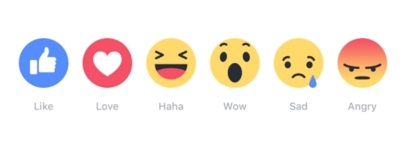Three Things Event Marketers Should Know About Facebook Reactions

Facebook recently launched Reactions, an extension of the Like button, to give fans more ways to share their emotions to a post in a quick and easy way. According to Facebook, these emoticons - labelled as Like, Love, Haha, Wow, Sad or Angry - have been designed to increase engagement with posts.
Though the launch of these additional action items may seem minor at this time, it may end up having a significant impact on your brand’s reach and engagement in the long term. If you have been wondering what will be impact of Facebook Reactions on your brand’s presence on Facebook, or even if you haven’t, here are three key things you absolutely need to be aware of.
No Immediate Adverse Impact on Reach
At this point of time, Facebook is treating all reactions at par. If someone uses a Reaction, it’ll be taken as an indicator of the fact that they want to see more of similar content. This applies to both organic as well as paid engagements. This, however, could change in the long term because Facebook will continue to analyze ‘how Reactions should be weighted differently by News Feed to do a better job of showing everyone the stories they most want to see’.
Customer Service Will Be More Nuanced
People can now use a visual signal instead of typing out sentences to express their emotions and reactions. This may not only reduce the number of comments on your posts, but may also make it difficult to understand the reasons for the negative reactions. The launch of Facebook Reactions is a signal that marketers need to be prepared to spot overall trends in customer sentiment and respond more proactively to explicit negative reactions.
Deeper Insights in the Long Run
Despite the uncertainty of on the long term impact of Facebook Reactions on marketers posts and advertisement campaigns, there is no doubt that brands can now get a better understanding of how their content is resonating with their audience, and then use that information to take specific actions. They can choose to provoke more reaction or change their messaging based on their campaign goals. Over time, as Facebook provides more detailed analytics, it may become easier to gauge the impact of each type of Reaction on extending the overall reach and engagement of their posts.
In summary, while the Facebook Reactions are still in their infancy, if Facebook is a channel where your event has an extremely active fan following, then this is the time to start building a dedicated team that can anticipate and manage a more nuanced reaction from your audience.


Add new comment